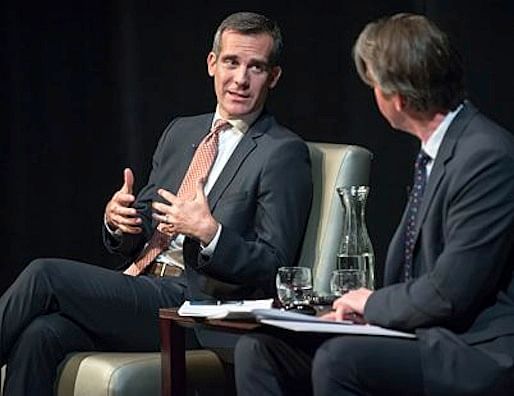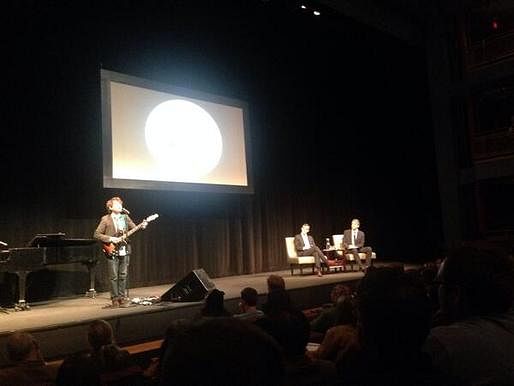

Last night on the bucolic hilltop campus of Occidental College, Los Angeles Mayor Eric Garcetti spoke with the Los Angeles Times architecture critic, Christopher Hawthorne, about the state of L.A. urbanism. This broad topical platform positioned Hawthorne's interview not as a political interrogation, nor as a staged public appearance, but as a relaxed discourse for Garcetti to mention policy while riffing on the kind of place he believes L.A. is becoming. You can review Archinect's live-tweets of the event here.
The discourse of L.A. urbanism is often bogged down by insufficient comparisons and false dichotomies -- sprawl vs. density, cyclists vs. drivers, liberals vs. libertarians, east vs. west, etc. -- that doggedly try to force the region into the conventions of other, completely incomparable cities. Early on, Hawthorne made clear that "Los Angeles" has to be thought of on the "regional scale", and shouldn't copy the developmental models of radically different cities. Garcetti certainly empathizes with this perspective: as mayor of the City of Los Angeles, he negotiates with the 87 other mayors located in L.A. County, and is keenly aware of its massively impacted layers of government -- its resources spread thinly and into cagey factions, unable to look out for anyone but themselves.
Garcetti was adamant, in parts poetic, about L.A.becoming a place one could, and would want to, "get lost in", where the mega-region is dignified by accessible and pervasive public transportation, and greenspace isn't delegated to the front or back yard. Hawthorne reciprocated, having noticed since he moved to L.A. in 2004 a palpable desire to increase connectivity and invest in public space. It may seem romantic to imagine that such idealism will translate easily into tangible and persistent policy, but that romanticism is inspiring and encouraging in a city on the cusp of radical (and absolutely necessary) change, responding to climate change and unsustainable transit models.

And after all, this wasn't a political rally. Halfway through their discussion, Hawthorne brought to the stage Gabriel Kahane, a young composer who has just released an album explicitly inspired by Los Angeles landmarks. He performed a couple of songs, one Cohen-esque folk-tune about the Ambassador Hotel, and another jaunty baroque-pop number questioning movie villain's insistence on living in homes built by modernist masters. A musical interlude to a dialogue on urbanism seemed awkwardly out of place at first, but by the end of the night, perfectly appropriate. L.A. can continue to be a city of self-referential icons, even as it seeks to define new ones.
No Comments
Block this user
Are you sure you want to block this user and hide all related comments throughout the site?
Archinect
This is your first comment on Archinect. Your comment will be visible once approved.